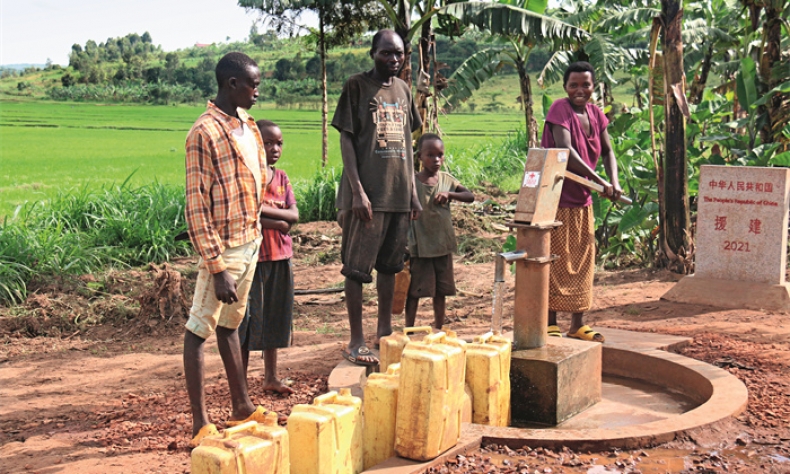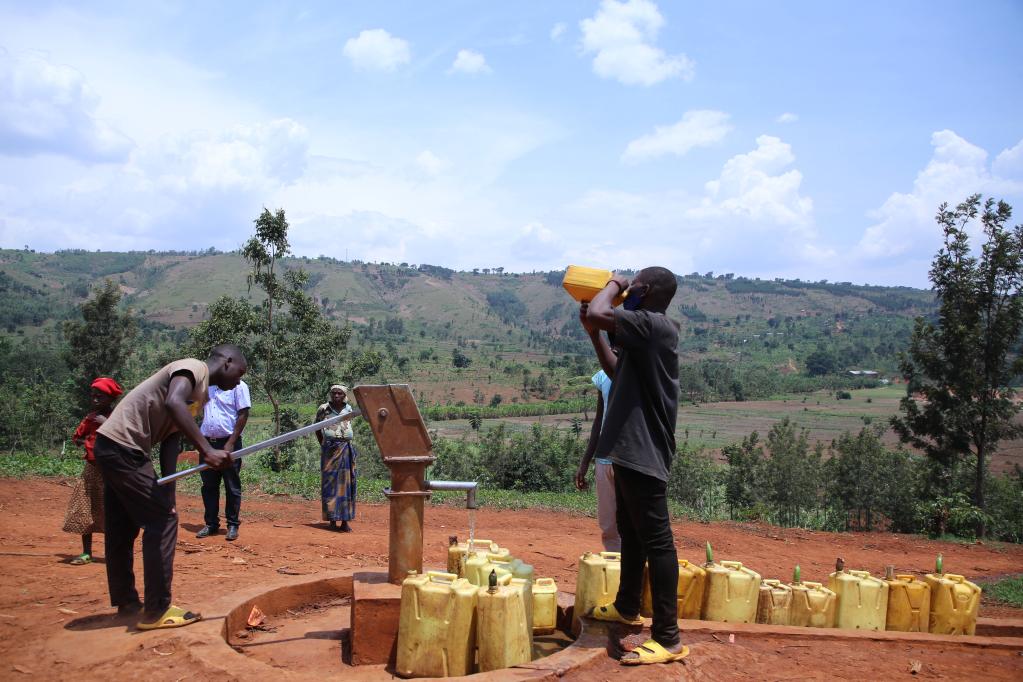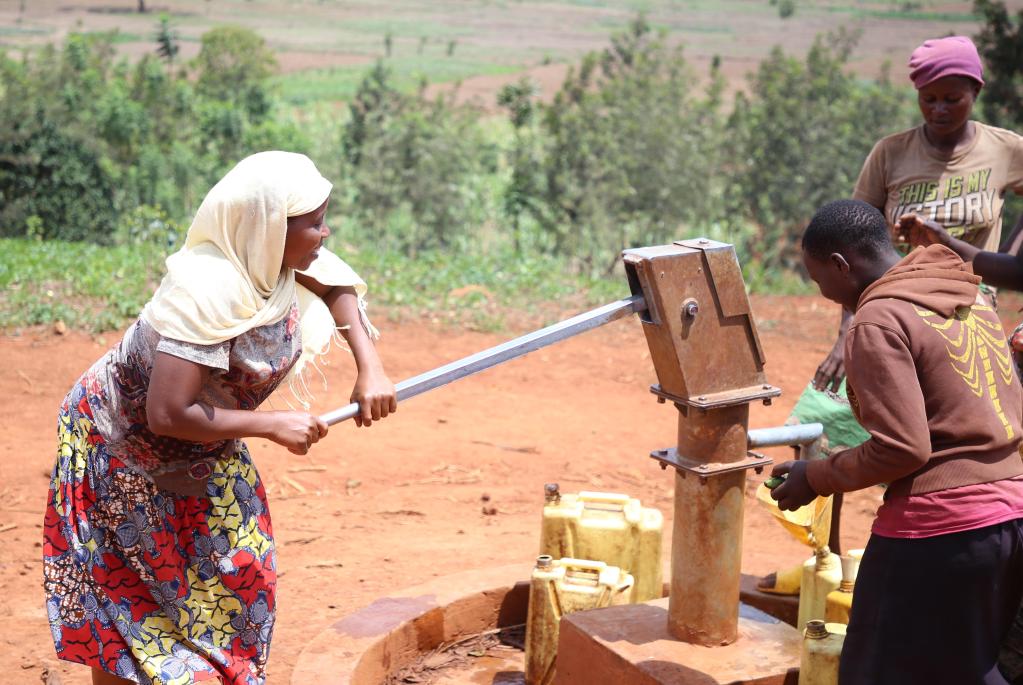Tapping into Clean Water

China-aided borehole project boosts access to safe water in Rwanda.
Gerald Kazungu and other residents of Rugarama Village in Kazo Sector of Ngoma District in east Rwanda had been facing a profound lack of access to clean and safe water for more than two decades.
“In our village, we suffered a lot because of lack of clean water; people had to walk as far as 4 km to other sectors in search of clean water,” said 48-year-old Kazungu, a father of eight.
“Residents were consuming contaminated water from nearby swamps, ponds and dams, which caused diarrhoea and other waterborne diseases,” he said.
But thanks to aid from the Chinese government, conversations about water woes are a thing of past among local people. China-funded boreholes are providing a lifeline to water-deprived communities in the region.
Chinese engineering giant, China Geo-Engineering Corp. (CGC), has constructed a borehole just outside the home of Kazungu for the residents of Rugarama Village.
The borehole project plans to establish more than 200 boreholes, 150 of which have already been installed, in remote rural areas across nine districts in the country’s eastern part to ease water challenges.
Lack of access
Before the installation of these boreholes, residents used to face a profound lack of access to clean water for household use and their livestock.
Kazungu revealed that because of the scarcity of clean water, at least 80 percent of all residents in his area were forced to buy a 20-litre jerry can for 300 Rwandan francs ($0.28) to meet their daily needs.
The water scarcity further increased during dry spells when one would have to spend about five hours in a queue to get water.
In particular, Rwinkwavu area in Kayonza District was one of the highly affected areas in Eastern Province, where residents had to walk over 5 km to reach the nearest clean water source.
ChinAfrica has also learnt that Eastern Province of the country has many cattle keepers, and most of them struggled to get clean water for their animals.

Fred Rudasingwa, a resident of Karangazi in Nyagatare District, said that before the installation of the boreholes in his area, his family and many other residents used to share a small pond of rainwater for livestock. Some people had started digging small ponds in their lands to store water before the arrival of the Chinese government aid.
Rudasingwa said that the availability of clean water at their doorsteps has brought immense joy to the entire community, especially women who are the ones responsible for fetching water. Now, they do not have to trek long distances looking for swamp water, which is not even clean.
For Flora Muhimakazi, wife of Rudasingwa, the availability of water has helped them a lot because they can now spend more time on other chores. This has also made it easier for households to run small businesses, especially those living in trading centres, since they now have more time on their hands. Muhimakazi, for example, is running a small shop in the area.
Benefits for the community
In the Rwinkwavu Trading Centre, residents told ChinAfrica that the newly constructed boreholes have helped them to achieve their education goals.
Five young men who talked to ChinAfrica on the benefits of newly installed boreholes said the borehole project came at the right time to address a serious water problem. Besides being free, borehole water is safe.
“It has helped our neighbours a lot. We are excited about it and thankful to the Chinese government,” said Jean Damascene Habarurema, a clothes shop owner in the locality.
“Scarcity of water was a big problem for the entire community,” said Habarurema. “The only option we had was to hire people with bicycles to fetch water for cooking and drinking. But it was not sustainable; it was a costly option.”
Besides boreholes with hand pumps, the project has also helped to install solar-powered pumps in some parts of Eastern Province.
Teachers and administrators of a school in Rwinkwavu, one of the beneficiaries of the borehole project with solar-powered pumps, indicated that the newly installed pump is helping them to achieve their education goals with reduced cost.
“The entire school is excited about the new borehole funded by the Chinese government,” said Magnifique Habimana, principal of the school.
He said he did not even want to recall the times when they had to purchase tanks and tanks of water from outside for drinking, cooking and cleaning.

“Those were very challenging days at the school,” recalled Habimana.
He told ChinAfrica that it was a very big inconvenience for the school in terms of sanitation and running costs, as the only option was to hire people to fetch water. “It was costly.”
According to the principal, the school’s sanitation and hygiene standards have now improved with the new water source.
“We thank the Chinese government for maintaining cooperation with Rwanda, which enabled the implementation of this water project. Now, we can grow crops in all seasons because we have water to irrigate the crops,” he said.
“CGC has delivered quality work and drilled and installed standard boreholes with all materials of high quality,” said Prosper Manikuze, a standards and quality control specialist in Rwanda’s Water and Sanitation Corp., that has closely followed the project.
Jean Damascene Harelimana, vice mayor of Kayonza District in charge of social affairs, said the newly installed boreholes will positively affect the health and wellbeing of many people.
“We are all happy about the water project. We are also happy about the cooperation between Rwanda and China, which is bringing more benefits to people,” said Harelimana.
“Lack of access to clean water increases the risk of outbreaks of waterborne diseases, including acute watery diarrhoea and cholera,” noted Harelimana.
He revealed that the borehole project has boosted water access in entire Eastern Province and currently benefits at least 110,000 people.
Chen Jinke, manager of the borehole project, said the boreholes are well constructed with high quality, and the impact is good and visible to the public.
Chen said the boreholes are installed with chlorination systems to ensure the water is clean and potable, and solar pumps are installed in places with a high concentration of people such as markets and schools.
ChinAfrica has learnt that the borehole project covers nine districts, including seven in Eastern Province, and two in Southern Province. The whole project is estimated to cost up to $8 million.
 Facebook
Facebook
 Twitter
Twitter
 Linkedin
Linkedin
 Google +
Google +










